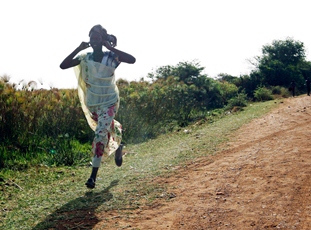Unity state citizens flee to Juba
By Bonifacio Taban Kuich
May 10, 2012 (BENTIU) – As the price of living continues to rise and the North-South Sudan border conflict rumbles on, more than 100 people leave Unity state every day according a manager of a local bus station

On May 4, Pagan Amum, South Sudan’s chief negotiator with Sudan, said
that a trade embargo had been in place from May 2011; before the independence of South Sudan. He also accused Khartoum of having a “shoot to kill” policy for Sudanese citizens trading with the South Sudan.
Traders in Unity state have responded to the embargo by increasing the prices of basic commodities which they are often sourcing from Uganda, via the South Sudan capital, Juba.
Major crop failures in 2011, as described in a South Sudan Ministry of Agriculture January 2012 report, have also affected the price of food stuffs.
Since South Sudan’s independence, relations between Juba and Khartoum have not been as strained as they are now. Negotiations over the use of the pipeline which transports landlocked South Sudan’s oil to the coast of its northern neighbour and border demarcation have broken down, leading to military hostilities. which began in March.
On 3 May the UN Security Council, with the backing of the African Union, gave Sudan and South Sudan 48 hours to lay down their arms or face sanctions. On Thursday the Sudanese president Omar al-Bashir said the threat would not alter his policies.
Mohamed Salah El-Niem, a North Sudanese trader who has lived in Unity state for 12 years described the economic difficulty faced in the state. He said “all items became expensive because of the dollar going very high in Juba,” a situation he attributed to the ban of goods from North Sudan and rising fuel costs, which has in turn impacted upon the cost of transportation.
In the row over the use of the pipeline which passes through North Sudan, Juba halted production in January; a move described as “suicidal” by prominent Sudan expert, Alex de Waal. South Sudan relies upon oil revenues for 98 percent of its budget.
Moses Gatthiang Yiew a manager for MTRO Peace Transportation Company in Kalibalek told Sudan Tribune on Thursday that his transportation company had registered 45 passengers travelling to Juba that day.
Many of the state’s citizens are going to the four bus stations in the state capital, Benitu. For many, the lure of the country’s capital is more affordable living, both in terms of accommodation and commodities.
In Benitu the average price of a 50kg bag of maize flour was 150SSDG
[US$56] in March and has now rocketed to 230SSDG [US$86].
(ST)
